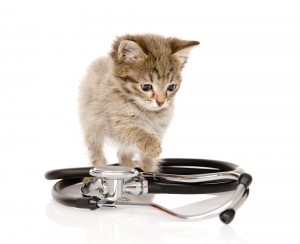Kitten Plan
Information for New Kitten Owners
Getting a new kitten can be an exciting and scary endeavor. One of the most important parts of your kitten’s first few months is proper veterinary care. This includes vaccinations, fecal exams, deworming, and spaying/neutering if you desire. Vaccinations are important to prevent many diseases that our pets are exposed to on a daily basis. Fecal exams and deworming make sure that your pet does not have any intestinal parasites (including worms, giardia, etc.). Besides being a determent to your pet, many of these parasites can be spread to humans – especially children. Here is a basic list of veterinary care your pet should receive in the first 6 months:
First Kitten Examination (8 weeks old):
- Comprehensive physical examination
Vaccinations: - Feline Distemper-Rhinotracheitis Combo #1
- Feline Leukemia Testing
- Discuss Pet Food*
- Discuss Preventative Parasite Control – Begin Revolution once monthly if necessary.*
- Have owner bring fecal sample at next visit for analysis.
Second Kitten Examination (12 weeks old):
- Comprehensive physical examination
Vaccinations: - Feline Distemper-Rhinotracheitis Combo #2
Feline Leukemia #1 (If outdoors) - Rabies (1 year)
- Fecal examination; Deworm if unable to collect fecal.
- Discuss Dental Care – Toothbrushing*
Third Kitten Examination (16 weeks old):
- Comprehensive physical examination
Vaccinations: - Feline Leukemia #2 (If outside)
- Discuss Spay/Neuter Options*
- Discuss Pet Insurance Options*
6 Months old:
- Spaying or Neutering
- Feline Leukemia Testing and Feline Immunodeficiency Virus Testing
- Microchip Implantation
Begin T/D twice daily and breathlyser*
*indicates accompanying handout.


